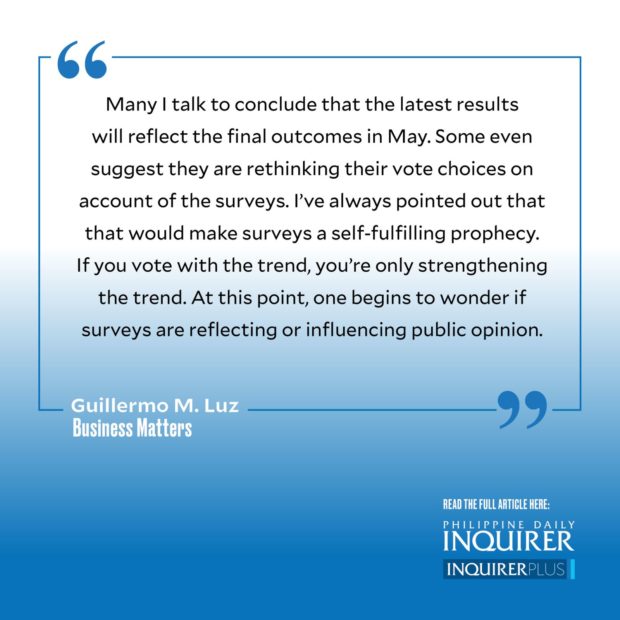Do surveys influence public opinion?
 With elections inching closer—there are only 80 days left to election day—expect to be flooded by public opinion surveys on who people will vote for. The conventional question asked in most surveys is “Whom would you vote for President (or Vice President or Senators) if elections were held today?” The operative word is “today.” But remember that elections are still 80 days out.
With elections inching closer—there are only 80 days left to election day—expect to be flooded by public opinion surveys on who people will vote for. The conventional question asked in most surveys is “Whom would you vote for President (or Vice President or Senators) if elections were held today?” The operative word is “today.” But remember that elections are still 80 days out.
So here are a few of my personal observations about surveys and the way people react to them. Many I talk to conclude that the latest results will reflect the final outcomes in May. Some even suggest they are rethinking their vote choices on account of the surveys. I’ve always pointed out that that would make surveys a self-fulfilling prophecy. If you vote with the trend, you’re only strengthening the trend. At this point, one begins to wonder if surveys are reflecting or influencing public opinion.
First of all, there are basically two types of surveys floating around. The first are surveys which use a statistically randomized sample of the voter population. This enables them to infer what a general population is thinking at the time of the survey. The best-known examples are Social Weather Stations and Pulse Asia. The other type constitutes online surveys that anyone can answer. The samples are self-selected. Thus results reflect only the sentiment of those who answered but cannot be used to infer or project what the general population is thinking. These surveys cannot be interpreted in the same way you would interpret an SWS and Pulse Asia survey.
It’s good to remember that SWS and Pulse Asia surveys are done periodically—currently monthly—and each survey basically represents a “snapshot” of what the public may be thinking at that time. Results have been known to shift over time, as we have seen in the past. For instance, in the 2010 and 2016 elections, survey results in January changed significantly as we approached election day.
Note that for both surveys, respondents are registered voters for the 2022 elections. Many people are set on voting. A vast majority of registered voters says they will cast a vote in May. Indeed, in most presidential elections, voter turnout is very high at around the 80 percent plus level. However, the decision on who people will vote for is more fluid. Almost half say there is a possibility that they may change their minds about who they will vote for between today and election day. So not all is quite set in stone for a large number of people. Note that there are not many “undecideds” at this stage. People have a preference already but may just change their minds. That’s quite different from being completely undecided.
Both pre-election and even nonelection-related surveys capture public sentiment or experience on a range of issues from hunger and poverty to inflation, jobs, management skills of candidates, and even foreign policy issues like the West Philippine Sea. It would be worthwhile for both voters and campaigns to draw conclusions on which candidates are best equipped to address each issue and make the case for or against their chosen one. With almost three months to go to election day, there’s still time to make the case.
Surveys are being used to measure the “winnability” of a person. My view is that the only person who determines “winnability” is the voter. Voting for your choice and convincing others to join you is one way of making a candidate “winnable.” Following a survey to make your vote may be a trap you will regret falling into.
With 80 days to go, we all need to reflect on how we view surveys—as an influencer or a reflection of public opinion.
—————-Guillermo M. Luz is a former secretary-general of Namfrel and served for five elections.
——————Business Matters is a project of the Makati Business Club (makatibusinessclub@mbc.com.ph).




















